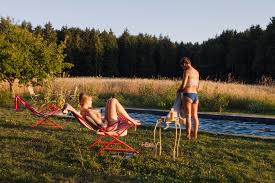



Dir: Ramon & Silvan Zürcher | Drama
After winning the Best Director prize at the 2021 Berlinale Ramon & Silvan Zürcher return with what they describe as the third film in their animal trilogy which premiered in the International Competition at this year’s Locarno Film Festival.
We are introduced to a pastoral scene that envelops a sense of dread as a bourgeois household begins to welcome a family get together to celebrate a birthday. Karen lives with her husband Markus and their children in her idyllically located childhood home. For Markus’ birthday, Karen’s sister Jule, her husband Jurek and their two children come to visit. All of them looming among the lush green of summer and with the regal blaze to come alongside the brute centre part of an iridescent moth.
The normal representations of a very similar scenario are all here: Families and their oppressive nature, tension between sisters, mothers and daughters and the constant competition and finally the way a family home holds memories and negativity. The problems with these tropes are the need to distinguish yourself from the great works that have come before you. For a time Der Spatz im Kamin manages to do this and intrigues the audience with what will come.
As we slowly begin to engage with the characters, the tropes slowly merge into cliche: the duality of the sisters, Karen is stern and rigid, constantly internalising her sense of self hatred and Jule, easy going, rhythmical and superficially happy. Jules’ daughter Johanna and the back and forth between them of boundaries being pushed which seems to hide more than the usual teenage rebellion. An unspoken visual clue is how alike both emotionally and physically Johanna and Jule are. Of course alongside that is Johanna’s burgeoning sexuality and her discovery of that power.
Like their previous films this is constantly surrounded by animals, insects and nature both in the house and outside of it. In fact the house is completely open, with windows and doors allowing the coexistence of both human and nature. In fact the house in itself and it’s unspoken history is alive to the constant discourse (both internal and external) between characters that always seems to take place in rooms and doorways.
Brushing against their family at certain moments is Liv who recently moved into the small house on the edge of the woods and who harbours numerous secrets most predictably that she is sleeping with Karen’s husband Markus.
In the second half it really loses its way and descends into the obvious with metaphor after metaphor: cracked plates, smashed glass. For a film that is trying to go beyond verbal language it really begins to sell itself short becoming a constant metaphor intermingled with tonal non sequiturs. A low rent Angela Schanelec is what springs to mind and to come we have children murdering animals and of course a burning house and the idea of character rebirth and wife/mistress swapping roles and personalities. Like I have pointed out earlier trope after trope that doesn’t won them and do anything different than we have seen in far better films.
The filmmakers previous films had a unique sense of the other/uncanny which was disconcerting and discombobulating. This maybe is a film too far and it might be a time for a creative reset. ©️ D W Mault
SCREENING IN COMPETITION AT LOCARNO INTERNATIONAL FILM FESTIVAL 2024